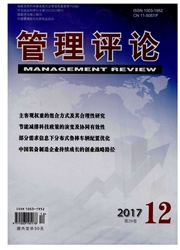

 中文摘要:
中文摘要:
本文从情感角度切入,考察变革型领导对工作投入的影响,探讨正性情感的中介作用和情绪智力的调节作用。采用问卷调查法对于某基层服务性单位员工开展调查,最终共得到有效问卷211份。通过采用多元回归分析、验证性因素分析和调节中介模型等方法,统计结果支持了研究假设。研究结果发现变革型领导对工作投入有正向影响;正性情感中介了变革型领导和工作投入之间的关系;情绪智力调节了变革型领导和正性情感的关系,情绪智力越高,变革型领导对正性情感正向影响越弱。此外,情绪智力调节了正性情感在变革型领导与工作投入之间的中介作用。
 英文摘要:
英文摘要:
Previous studies suggest that transformational leadership would facilitate work engagement. However,the mechanism underlying such process remains unclear. Therefore,this study aims to fill the gap by investigating the mediating effect of positive affect and moderating effect of emotional intelligence. We collect data from 211 employees in a public service organization and use established measures to capture key variables in this study. The reliabilities of all scales are above 0. 70. Multiple regression,confirmatory factor analysis and moderated mediation model are employed to analyze data. Confirmatory factor analysis indicates the four key variables are discriminated. Regression analysis shows that transformational leadership is positively associated with work engagement,and it is mediated by positive affect. In addition,emotional intelligence moderates the relationship between transformational leadership and positive affect. Specifically,the relationship is less positive when emotional intelligence is high rather than low. Moreover,moderated mediation analysis find that emotional intelligence moderates the indirect effect of positive affect. In particular,the mediation effect of positive affect is more positive and stronger when emotional intelligence is low. Contributions,practical implications and limitations are discussed.
 同期刊论文项目
同期刊论文项目
 同项目期刊论文
同项目期刊论文
 期刊信息
期刊信息
